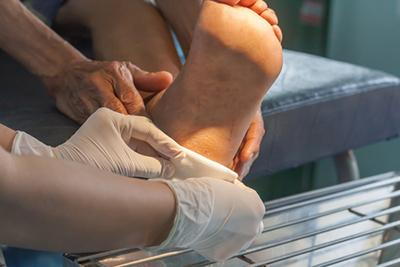The Importance of Caring for Your Diabetic Foot Wounds

- posted: Sep. 15, 2023
Caring for diabetic foot wounds is critically important because those with diabetes are more likely to develop complications, which can cause them to face serious health issues and potentially amputation. If you are diabetic with a foot wound and live or work in the greater Asheville, NC area, contact Moore Foot & Ankle Specialists to assist in helping heal a diabetic foot wound.
Why it’s Important to Care for a Diabetic Foot Wound?
Diabetes is a systemic condition that impairs one’s ability to heal in the same amount of time or overall. In addition, diabetics have –
An Increased Risk of Infection
Diabetics are challenged with keeping their blood sugar levels as near to normal as possible to ensure the body has the capacity to fight potential infections – anywhere in the body. It is noted that even minor wounds or simple blisters can rapidly become infected if left untreated or improperly treated. The problem intensifies when the infection spreads to more systemic conditions like cellulitis, among others.
The Potential Development of Ulcers
An ulcer or open sore can happen from injury, friction, or pressure. Ulcers tend to be slow healing and can become infected and lead to tissue damage.
Nerve Damage
Many people with diabetes experience neuropathy, a loss of sensation caused by nerve damage. With the sensation loss, a diabetic may not notice unhealed wounds until the condition becomes significant and severe.
Peripheral Arterial Disease
Diabetes causes peripheral arterial disease (PAD), which limits blood flow to a diabetic’s extremities. This causes poor circulation, which makes healing that much more challenging for those with diabetes.
Chronic foot issues can affect one’s quality of life, impacting mobility and creating pain. In addition, the consequences are quite severe because amputation is possible for a diabetic foot wound that becomes infected and left untreated.
Simple At-home Foot Care Suggestions for Diabetics
- Clean and inspect your feet daily for sores, cuts, infections, etc. Ask for help if needed.
- Clean wounds with mild soap and water. Before covering with a sterile bandage, apply an antibiotic ointment.
- Maintain recommended blood sugar levels.
- Choose proper-fitting, comfortable footwear that provides support.
- See a podiatrist regularly to address foot issues as they arise.
Contact a Leading Asheville, NC Podiatrist Today
Taking these precautions and seeking prompt medical attention for a diabetic foot wound or related complication can help reduce the risk of severe diabetic foot problems. For more information, contact Moore Foot & Ankle Specialists in Asheville, NC at (828) 350-1880.

